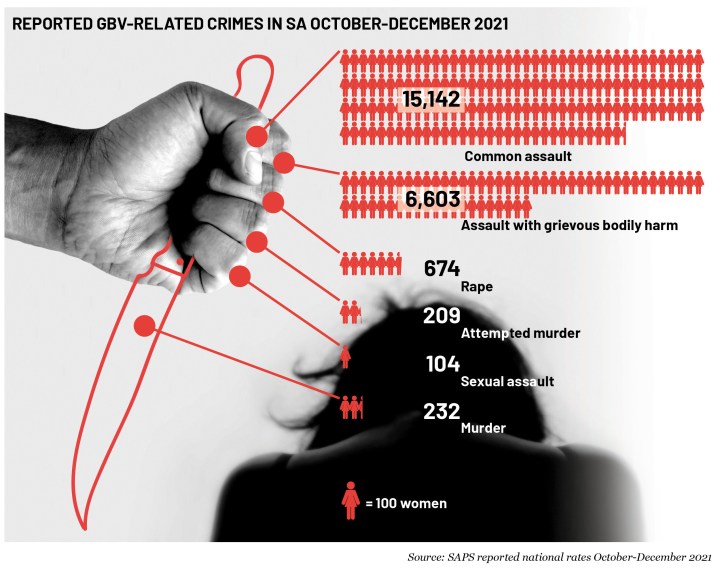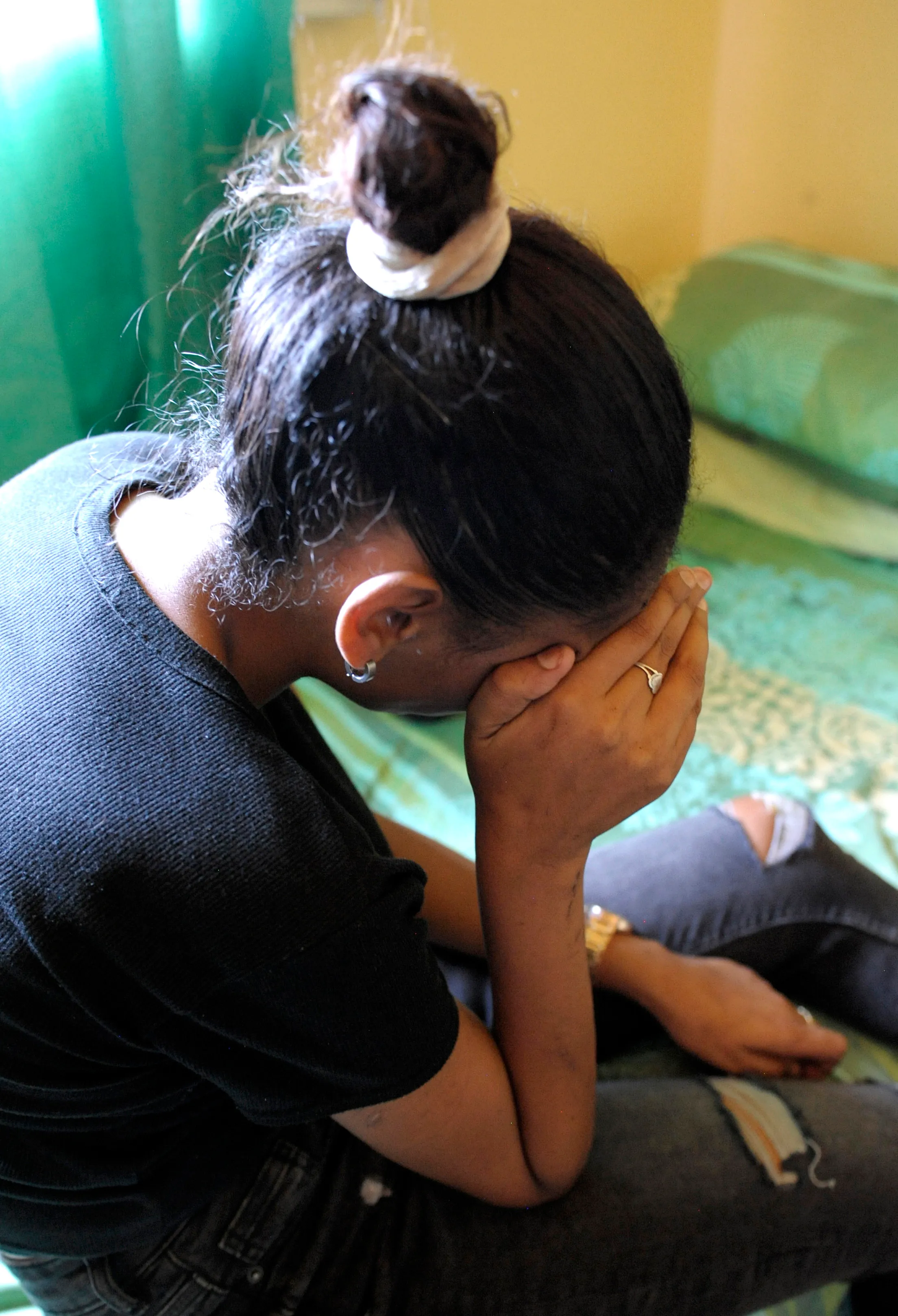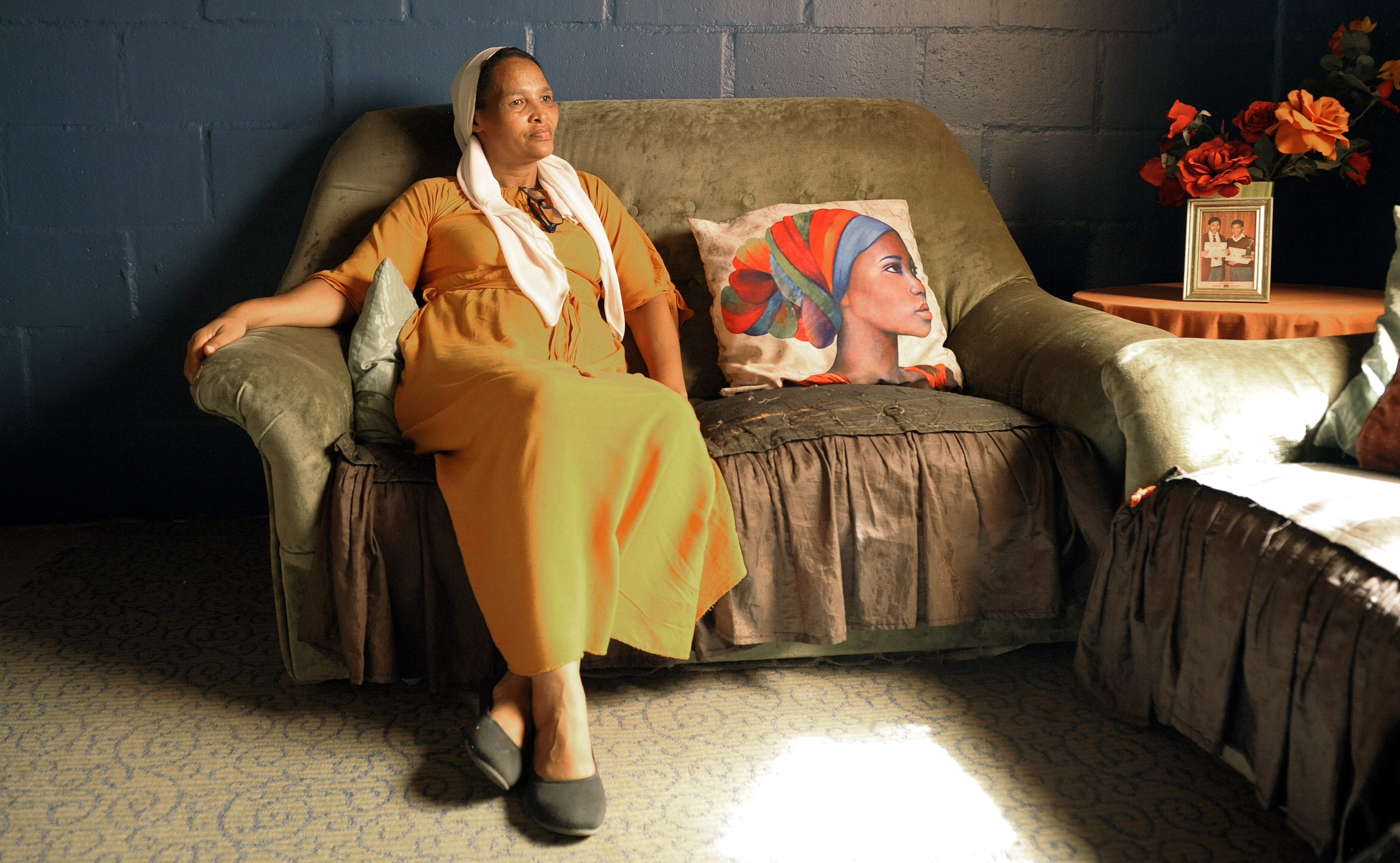DYING FOR JUSTICE
Cries for help ‘dismissed’ as young rural mothers succumb to gender-based violence

Victims of gender-based violence in rural areas struggle to open cases at police stations, where they say they are treated with indifference. Then there’s the matter of getting to courts, which, like police stations, are often in different towns.
Case study: Marina May
Marina May’s cousin died on New Year’s Day as a result of injuries allegedly sustained during multiple acts of gender-based violence. May believes if police had acted in time to help her cousin, she would be alive to care for her one-year-old baby.
The latest crime statistics, which cover October to December 2021, show that 902 women and 352 children were killed during this period; 232 of these murders were identified as a result of domestic violence.
Attention to gender-based violence is often focused on cases in urban areas, neglecting women in rural communities, who face additional challenges in accessing justice and support to open cases at police stations.
Hannie Mpayeli, May’s cousin, died after struggling to get help from the police in Velddrif on the West Coast. Mpayeli, who was 44, lived on a farm in Dwarskersbos, near Velddrif, with her boyfriend of more than 20 years. The couple had five children, and Mpayeli had a 27-year-old son from a previous relationship.
“All these years, he hit her,” claimed May, describing her cousin’s relationship.
May told DM168 that, on 4 December 2021, her cousin was beaten by her boyfriend. Mpayeli was “full of blood” after being hit with a wooden plank, allegedly by her boyfriend. May said the couple’s 19-year-old daughter was beaten after she tried to intervene. The police were called to the farm. May claims the police dismissed the case. They put it down to “it’s drinking”, and left.
On Monday, 6 December, Mpayeli went to the police station to lay charges. According to May, a statement was taken by police and she was given a J88 form to provide to doctors for an examination of her injuries. Mpayeli did not have enough money to get to the hospital after going to the police.

A young Saldhana Bay woman was assaulted by her ex-boyfriend in February 2022. Residents of her small community say gender-based violence has been slowly increasing. (Photo: Joyrene Kramer)
Mpayeli’s eldest son gave her travelling money to reach Vredenburg Provincial Hospital – about 40km away – on Thursday. She then returned to the police station with the completed form. A police official told her that her case was not registered – despite her having been given a J88 form, and despite still being injured. Her face still bruised, she had to redo her statement.
Mpayeli’s boyfriend was picked up by the police early on Friday. He spent four hours in a jail cell before appearing in court. “He left with a warning that he cannot have direct or indirect contact with her,” said May
“Afterwards, he came to fetch the baby and he took the baby to Dwarskersbos; [Mpayeli] couldn’t say anything because she was scared.”
On Saturday, Mpayeli needed to collect their one-year-old child, whom she was still breastfeeding. She knew that she needed to bring alcohol to her boyfriend to appease him. May said her cousin borrowed money, then hiked 10km to get to their house. When her boyfriend saw only R60, he questioned why she had so little money. “He told her to come so they could buy wine, she was scared of him so she went with him,” said May.
The couple returned home, where May said her cousin was made to drink with her boyfriend. “She had to drink along… Nobody knew that he forced her to drink,” said May. Mpayeli would drink to cope with her circumstances, as “most of the time, her face was sore from being beaten”.
Mpayeli’s boyfriend questioned why she had only returned then and asked where the police were because he had had to sit in a jail cell. May said her cousin relayed what allegedly transpired: her boyfriend grabbed an iron and beat her. The six- and seven-year-olds turned up, then ran away in fear that he would strike them. Mpayeli’s boyfriend beat her, kicked her in her stomach and she lost consciousness. When she regained consciousness he continued to beat her until she was bleeding. Mpayeli kept the baby close so the child would not be hurt. He continued kicking her.
On Sunday morning, the children arrived back home after hiding at a neighbour’s house. May said her cousin tried to speak to the children, but struggled as her face was injured. One child was tasked with looking for an ambulance and another was tasked with calling a neighbour.
According to May, the neighbour was shocked by Mpayeli’s appearance. When the ambulance arrived, Mpayeli was rushed to Vredenburg Provincial Hospital, and then driven to Somerset Hospital in Cape Town. “When she arrived there, it was already set up for emergency surgery.”
Mpayeli’s stomach was flattened from all the beatings. She received emergency surgery on Sunday, 12 December, and spent five days in the intensive care unit.
May was called to collect her cousin on Christmas Eve. After she was discharged, Mpayeli and May went straight to the Velddrif police station to report the extent of her injuries. They were intent on getting a warning issued against the boyfriend. On Tuesday, 26 December, May tried to put pressure on the police because her cousin’s statement had still not been taken. “They [the police] knew of her and yet he still walked free,” she said.
Mpayeli also went to the clinic to have the dressings on her wounds changed.
After pressure from various quarters, a police van was sent to Mpayeli to collect her statement, which also detailed how her situation was being mishandled by the police.
May also visited the station commander to express her disappointment at how Mpayeli’s case was being handled.
May said that because Mpayeli was in pain on Sunday afternoon, her oldest son had gone to the police station to report her case, and was asked by the police: “What business do you have with your mother?”
According to May, the police were sent to Mpayeli after her son had waited for more than an hour to be assisted. But when police arrived in the early evening, Mpayeli had been taken to hospital. She could not walk because of her injuries and had picked up an infection.
On Saturday, New Year’s Day, she died, at the age of 44.
“I personally feel, if the police had acted on the first assault, or the second time, then that one-year-old baby would not have sat now without her mother’s milk,” said May.
Mpayeli’s younger children are in Knysna now. Her 19-year-old daughter still lives in Dwarskersbos, traumatised.
Mpayeli’s boyfriend is scheduled to appear in the local court on 28 March on charges of assault and attempted murder.
May has her own intimate knowledge of gender-based violence. She divorced an abusive husband and now runs an early childhood development centre in Velddrif. She works as an activist, giving motivational talks at workshops for women and helping families dealing with problems.
In Velddrif, May told DM168, there were problems with the police and organisations that were supposed to help victims.
“If everyone plays their part in this community – police, social services – if we work together on this, then we won’t have a problem where women, young mothers with babies lose their lives. You can save a life by just fulfilling your role,” said May.
In response to queries about the handling of Mpayeli’s case, Warrant Officer Joseph Swartbooi from the South African Police Service in the Western Cape, said it was risky to reveal sensitive information or give specific information about sensitive cases on a public platform as this could derail the investigation and court proceedings.
He confirmed the police had received a complaint about the handling of gender-based violence from the Vredenburg area.

Gender-based violence survivor Marina May in her house in Noordhoek, Velddrif on the Cape West Coast. She cites the failure of the local police and clinic to help GBV victims. (Photo: Joyrene Kramer)
Case study: Bianca Chantel Matroos
Revticken Patrick Muller was convicted of murder and rape at the Western Cape High Court on 22 February. He killed Bianca Chantel Matroos on the morning of 15 November 2019 after a night out at the Nitro nightclub in George. Her naked body was found on 17 November 2019 between two concrete blocks in the open cross-country field of the George Riding Club.
Case study: Hayley April
Early in February, 22-year-old Hayley April, a resident of Steenberg’s Cove, Saldanha Bay, did not return after she and her boyfriend dropped off her cousin, who lived with the April family.
The couple had broken up, but had been reunited for a year before this incident.
The family was used to April and her boyfriend dropping off her cousin as they shared the same circle of friends. She would spend time alone before April came home.
Her mother became worried when April did not return home soon after her cousin. Hendrik, April’s father, heard her boyfriend outside, half-naked, making “suggestions” about his daughter. Her father claimed the boyfriend had said that his daughter had got “what she deserved”.
The father was very concerned about his daughter’s whereabouts. That night, he walked 3km to the police station, then a group searched for her.
April later told DM168 that when she was driving with her boyfriend, he had started hitting her.
She fell out of the car. He tried to run her over. She rolled into a ravine. While there, “he came to look for me”. She was terrified. People called her name, and she assumed it was her boyfriend, so kept quiet.
“I was afraid,” she said. A dog, owned by her brother’s half-sibling, smelt her, then ran to where she was and alerted the group.
Her brother and his half-sibling had to piggyback her home. They then alerted her father, who had been worried that April may have been thrown into the Atlantic Ocean.
The family waited with their daughter at the police station from 3am to be transported to Vredenburg Provincial Hospital, about 20km away. There were no vehicles so the family had to wait until 5am, when, during the police’s shift change, a police officer took them to the hospital.
“I can’t remember anything [after the family arrived at the hospital],” said the traumatised young woman.
The community is angry about this incident, the latest in a string of incidents. Marches were planned during the alleged perpetrator’s bail application and the family has had assistance from political parties.
The boyfriend is out on bail of R5,000 after being charged with assault, rape and attempted murder, according to councillor Thyrone Williams, who has been part of a group helping the family.
Her father said the alleged perpetrator has since offered money for April to drop the case. “I can’t sell her pride,” her father said.
Lack of access to justice in dorpies
Victims, particularly women in rural communities, often have difficulties in accessing support from the police or courts in cases of gender-based violence.
Wendy Pekeur, co-founder the Ubuntu Rural Women’s Network, told DM168 that, in one example, a woman was denied police help in Klawer because she “smelt of alcohol” – despite having bruise marks on her face.
The police often act as mediators in domestic violence but, says Pekeur, “there’s no mediation in this”.
Another problem was that small dorpies do not have their own police stations, forcing victims to pay money to travel to the police or the courts. The police also often only arrive hours after initial callouts.
The police were often arrogant when complaints were laid, said Pekeur. Gender-based violence was also still seen as a private issue within the home. “A lot of them [police] still have that mentality.”
There was a lack of trust in the police, and even neighbourhood watches often worked alongside the police, dismissive of complaints about gender-based violence.
What should be done?
Pekeur suggests wide-ranging solutions to gender-based violence, including:
- Providing support to grassroots organisations, which are often the first responders in cases of gender-based violence;
- Getting rid of what Pekeur describes as “corrupt cops” who do not help victims of gender-based violence;
- Increasing the number of social workers in communities; and
- Using police caravans if there are limited options for police buildings, or using space in municipal buildings to support victims of gender-based violence.
Cele’s pledges
Responding to the latest crime statistics, Police Minister Bheki Cele said dedicated gender-based violence desks are now available at 381 police stations across South Africa.
Cele emphasised that “focused policing” had become the SAPS’s biggest arsenal.
“Through our 185 FSC [Family Violence, Child Protection and Sexual Offences] units, including nine Serial Electronic Crime Investigation Units (SECI), detectives are solely focusing their efforts and expertise in investigating crimes against women and children,” he said.
Three pieces of legislation aimed at strengthening efforts to end gender-based violence were signed in January: the Criminal Law (Sexual Offences and Related Matters) Amendment Act, the Criminal and Related Matters Amendment Act, and the Domestic Violence Amendment Act. DM168
This story first appeared in our weekly Daily Maverick 168 newspaper which is available for R25 at Pick n Pay, Exclusive Books and airport bookstores. For your nearest stockist, please click here.

[hearken id=”daily-maverick/9284″]


















 Become an Insider
Become an Insider
Comments - Please login in order to comment.